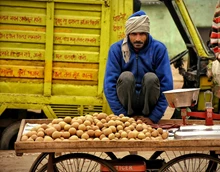
In a major scientific development, a group of researchers from the University of Madras and Presidency College, Chennai, has segregated an alga species that shows promise as an agent of biodegradation of plastic sheets. It could be a species of microalgae that’s generally present in Africa, Asia & Europe. In Rangoon, Burma, it was famous to be an epiphyte, attaching itself to different algae and vegetation.
It’s a preliminary study that has been published in Scientific Reports and needs additional analysis and research before it can be translated to the industry.
As per the annual report of the Central Air pollution Management Board, for the year 2011-12, the plastic waste generated in a year amounted to 5.6 million metric tons and 60% of the plastic used in India was gathered & reused. Metropolitan cities alone contributed about 21.2% of the entire waste, led by Delhi, followed by Chennai, Kolkata, and Mumbai.
Research Findings:
Right now, the standard techniques of plastic-waste disposal like land-filling, incineration, and recycling are in practice. These techniques have limitations and also generally produce side effects that might be dangerous to the setting.
So, a pool of researchers is focussing on some biodegradation strategies which might be protected, setting pleasant, and helps in Ecosystem Restoration.
In previous research, species of micro-organism that can degrade plastic have been analyzed. While in the current research, this function is performed by the Microalga Uronema Africanum Borge.
Sanniyasi Elumalai, Professor within the Division of Biotechnology, College of Madras, and his graduate college students Preethy P Raj and Dinesh Kumar Gunasekar, along with post-doctoral fellow Rajesh Kanna Gopal from Presidency School, stumbled on a plastic bag which was colonized by, as they got here to know later by research, three species of microalgae.
Prof Elumalai says, “We collected a polyethylene carry bag colonized by inexperienced, luxuriously grown photosynthetic microalgae and samples of water”.
“Viewing the collected polyethylene pattern beneath a light-weight microscope confirmed that it was colonized by microalgae… Abrasions had been seen on the floor of the polyethylene sheet at totally different magnifications.”
Confirmed Potential:
The samples had been collected on the Kallukuttai lake space close to Taramani railway station, in Chennai. After they did a better examination of the microalgal development, they discovered one species, Uronema africanum Borge, confirmed the potential to degrade plastic.
Within the experiments, they examined the microalga on low-density polyethylene, in sheets that are extremely immune to degradation, into less complicated molecules.
“We noticed that the remoted algae Uronema africanum produced enzymes, hormones, and a few polysaccharides which slowly degrade [the sheets], and the structural integrity of the polymer [breaks down] and it disintegrates into monomers,” says Prof Elumalai.
After incubation of the algae within the polyethylene sheet for thirty days, they observed beneath the microscope that there have been aberrations, ridges, grooves, and furrows within the materials of the sheets.
Following it up with mass spectrum evaluation and fuel chromatography and, they found that there was an enormous distinction within the composition of supernatant fluids of controls and experimental pattern.
Breaking Down Plastic:
“The microalgae produce totally different varieties of additional mobile polysaccharides, enzymes, toxins akin to cyanotoxins, hormones which react with the polymer sheets (polymer bonds) and break them up into the less complicated monomers which are not going to have a dangerous impact within the environment,” says Prof Elumalai.
For their evaluation, the researchers used the services of Central Leather-based Analysis Institute, Chennai, and Vellore Institute of Know-how, Vellore.
The researchers are planning to coordinate with businesses to take up this know-how into a pilot scale and eventually large-scale research.
(Source: The Hindu)











